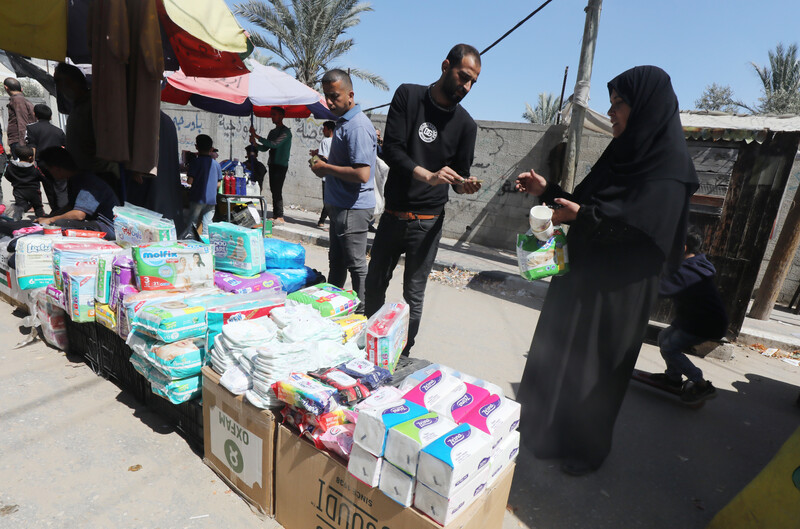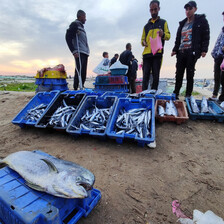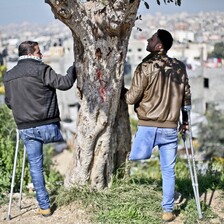The Electronic Intifada 7 November 2024

With most shops destroyed, street vendors have sprung up everywhere in Gaza. Here in Deir al-Balah in the central Gaza Strip in April.
The Electronic IntifadaIn the midst of a painful reality and under the weight of a merciless Israeli genocide, sometimes people in Gaza receive aid that brings a glimmer of hope. Even a small parcel with simple, seemingly trivial items, can provide a lifeline for some of us.
On 1 October, my family received such a package, containing a pair of girls’ shoes. The shoes didn’t fit anyone in our family, so I decided to go to al-Sahaba Market near al-Daraj neighborhood to try to sell them and buy something useful instead.
But no one bought them.
On my way home, I came across a vendor selling mattresses. My family needed one. The vendor, noticing the shoe bag in my hand, asked where I had bought the shoes. He was looking for a pair for his daughter.
I told him that I hadn’t bought them, but received them as aid, and that they didn’t fit anyone in my family.
“You want to buy a mattress, right?” he asked. I replied “Yes.”
“I’ll give you the mattress in exchange for the shoes you have,” he said to my surprise.
I told him I’d give him the shoes because I didn’t need them and he could benefit more from them, but that I also wanted to pay for the mattress since he had been working since morning and sat all day to earn his livelihood.
He initially refused my offer, but I insisted. Eventually he thanked me happily and said, “God sent you to me for He knows what burdens and sorrows His servant bears.”
Help and dignity
But then he grew thoughtful. “I hope my other daughters won’t be upset.”
“How many daughters do you have?” I asked.
“I have four daughters. These shoes are for my youngest,” he replied.
His words echoed in my mind the whole way home.
When I got home, I told my mother what had happened and said: “I want to help him; at least it will bring me some happiness in these difficult days.”
My mother gave me some money. I decided to give it to the vendor instead of buying shoes for myself. The next day I went to the spot where he usually spread out his goods, but he wasn’t there.
I would not be dissuaded. I returned the next day and found him.
“I came yesterday but didn’t find you, so I came again today,” I said. “I want to give you some money so you and your daughters can go and buy shoes that fit them.”
Initially the man refused, his pride preventing him from taking my money.
“I was a wealthy merchant before the war, but now I have lost everything ” he said.
I said we all had beautiful lives before. But I insisted that he take the money, “not because I feel sorry for you but because it makes me happy. “
He thanked me. But sorrow was still evident in his voice.
For me, the moment was a mixture of joy and sadness. Joy because I could help him. Sadness for the wounds inflicted on his pride and dignity.
Precarious lives
The experience reminded me of how precarious life and living conditions in Gaza are.
Some live in houses, while others live in tents. Some have their families nearby, while others have lost all their relatives or cannot reach them.
At the moment I started this article with – when you receive something that doesn’t fit – you find yourself in a difficult position. You are caught between your need and your desire to preserve your dignity. It’s not just about selling shoes that don’t fit or trading one thing for another; it’s about dignity in struggling against poverty and need.
I never imagined we’d be this helpless – and this is what hurts me most.
Our lives in Gaza are a daily struggle that cannot be reduced to just suffering or a need for aid.
We dream of a day when we can live in peace, free from want and oppression, with the dignity that befits our humanity, without this need for food and shelter serving as constant reminders of the helplessness imposed on us.
Our dignity is not a luxury; it is an inherent right, a right we believe we will reclaim one day, no matter how long it takes.
We do not seek sympathy. We seek our right to live with dignity.
Nada Hamdouna is a writer in Gaza.




